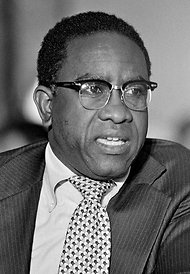
William E. Sauro/The New York Times
Andrew F. Brimmer in 1974, shortly after he resigned from the Fed board.
Andrew F. Brimmer, a Louisiana sharecropper’s son, was the first black member of the Federal Reserve Board. Dr. Brimmer, an economist, held a number of high-ranking posts in Washington and taught at Harvard, but the economic conditions of poor, powerless, uneducated blacks was an abiding concern. He spoke about what he called the “schism� between blacks who were educated and had marketable skills and those who did not. In later years he spoke frequently about how government policies no longer supported programs to help blacks enter the economic mainstream.
Dr. Brimmer was the assistant secretary of commerce for economic affairs when President Lyndon B. Johnson named him to the Fed board in 1966.
At the time, the Federal Reserve was bitterly divided over monetary policy. The chairman, William McChesney Martin Jr., threatened to resign if Mr. Johnson appointed a liberal who would vote in favor of lower interest rates.
At Dr. Brimmer’s swearing-in ceremony, the president said he did not expect Dr. Brimmer to be “an easy money man or a tight money man.� Rather, Mr. Johnson said, “I expect him to be a right money man.�
The Wall Street Journal expressed skepticism, with a front-page article headlined “Desire to Aid Negroes Could Make New ‘Fed’ Member More Liberal.� It quoted an anonymous source saying that the appointment was yet another example of Mr. Johnson’s political foxiness. “The president has Martin in a box,� the source told The Journal. “If Martin resigned now, it would look like it was because he didn’t want a Negro on the board.�
Early in his tenure, Dr. Brimmer followed the lead of Mr. Martin and other “tight money� board members by supporting a gradual increase in interest rates to fight inflation. But when Congress raised taxes in 1968 and cut spending to cut inflation, he was one of the first Fed governors to call for lowering rates.
At the Commerce Department, Dr. Brimmer’s primary responsibility was to reverse the country’s balance-of-payments deficit. He spent a good deal of time persuading American businesses to voluntarily slow their use of dollars in foreign investments. He also encouraged foreign companies to use their own currency to make investments in the United States.
In a speech in December 1965, he reported that his efforts had resulted in a drop in direct American investments overseas, to $515 million in the third quarter of that year from $1.12 billion in the first quarter.
That work built on his interest in foreign affairs, which started when he went to India with the Fulbright Program and wrote papers on the Indian economy.
As a staff economist at the Federal Reserve Bank of New York in the late 1950s, he was part of a team that visited Sudan to explore the feasibility of a central bank there. He later wrote an article on banking and finance in Sudan for The South African Journal of Economics. He became known as the international monetary policy expert on the Federal Reserve Board.
Dr. Brimmer served a little more than eight years of his 14-year term, leaving the board in 1974 to join the faculty of the Harvard Business School and start a consulting firm, Brimmer & Company. His academic career also included study in India at the Delhi School of Economics and the University of Bombay.
In 1995, he was chosen to head a five-member financial control board to help the District of Columbia deal with a financial crisis. He stepped down after a contentious three years in the job.
Andrew Felton Brimmer Jr. was born on Sept. 13, 1926, in Newellton, La. After graduating from high school he went to Washington State, where one of his sisters lived. He joined the Army near the end of World War II and attained the rank of staff sergeant, remaining in the United States.
Besides his daughter, who is the assistant secretary for international organization affairs at the State Department, he is survived by his wife, Doris Scott Brimmer.
Dr. Brimmer attended the University of Washington in Seattle on the G.I. Bill of Rights, earning an undergraduate degree in economics in 1950 and a master’s degree the next year.
He then went to India before attending the Massachusetts Institute of Technology and Harvard, where he earned a doctorate. In 1965, Dr. Brimmer was part of a federal delegation sent to Los Angeles after rioting in the Watts neighborhood left 34 people dead and tens of millions of dollars in property damage. He commissioned a Census Bureau study that found that the purchasing power of the average family in Watts had declined by $400 in the five years before the riots while incomes had risen in the rest of America.